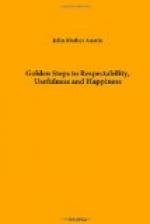There is no necessity that the young should resort to that which is low and vicious to find amusement. A thousand means of recreation surround them, of the most harmless character. The enjoyments of the paternal roof—the social party, where the young engage in sprightly conversation, or innocent pastimes—the friendly call—the perusal of interesting and instructive books—the scanning of the journals of the day, by which they can look out upon the shifting scene of the busy, restless world—the summer morning walk, to behold the opening beauties of the glorious day, and listen to the singing of the birds, the lowing of the flocks and herds, the murmuring of the streamlet, nature’s early anthem of praise to God—or the evening ramble, to watch the flowers as they open their fragrant leaves to be bathed in sweet distilling dews—to gaze upon the golden sunset, making the fleecy clouds to blush with a crimson glow, as the king of day bids them “good night;” or to behold the stars, as one by one they come forth to their appointed stations, bestudding the whole heavens with crystal coronets.—These, O youth! and countless other fountains, are open for you, from which the sweetest and purest enjoyments can be obtained. Seek for amusement—for pleasure—in these directions, and the cup which you press to your lips shall be one of unmixed happiness!
“While some in folly’s
pleasures roll,
And court the joys that
hurt the soul,
Be mine that silent,
calm repast,
A conscience peaceful
to the last.”
LECTURE V.
The Religious Sentiments.
“Remember now thy Creator
in the days of thy youth.”—Eccl.
xii. 1.
There are few subjects so generally uninteresting to the youthful as Religion. The great majority prefer to have their attention called in any other direction, and to be addressed on any topic, rather than this, which, in fact, is the most important of all. There is evidently a defect somewhere in this matter, which should be corrected. Where shall we seek for it? Not in any natural, inherent aversion to the subject of religion, resting in the hearts of the young. It is neither reasonable in itself, nor respectful to the Creator, to insist he has so constituted the human soul, that it is naturally and necessarily indisposed to a topic which is most vitally connected with its happiness, and which should receive a large share of its attention.
This indifference is to be attributed chiefly, I think, to improper impressions in regard to the nature and objects of religion. The young look upon it as something gloomy, saddening, and distasteful—something that forbids enjoyment, chains in dire bondage the free, glad spirit of early life, and casts dark and cheerless shadows on the sunshine of youth’s bright morning! They imagine it to stalk forth from a dark cell, arrayed in hood and cowl, to frown




